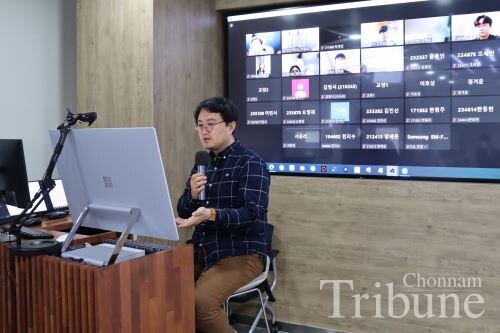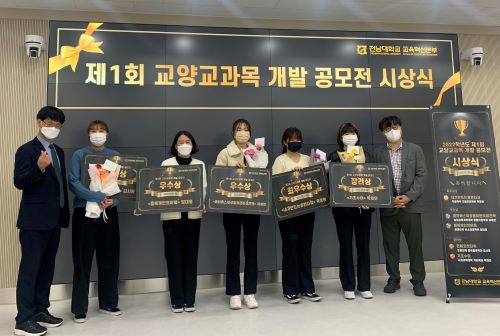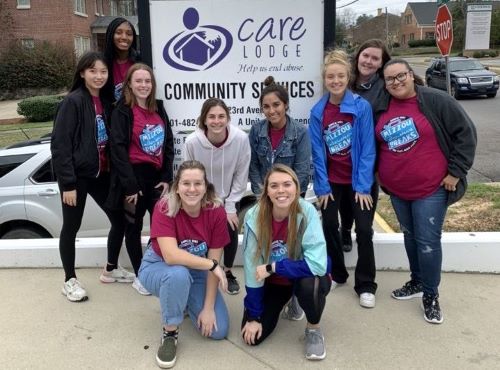
Universities worldwide are facing a crisis, exacerbated by the COVID-19 pandemic and the digital transformation that has shifted traditional educational systems towards innovative ones. Renowned futurist Thomas Frey predicted that "roughly 50 percent of universities will permanently close by 2030." This grim forecast for the existential crisis of higher education institutions underscores the urgent need for universities to adapt and innovate to survive in the current critical situation of a steady decline of school-age population due to the low birth rate. Because of this issue, the Ministry of Education of Korea hosted the "2023 Education and Talent Policy Seminar" on April 19 at the Government Sejong Convention Center to discuss key education reform policies and national talent development strategies. It was emphasized as one of the primary tasks that universities need to reform themselves at the seminar.
Most universities all over the country have tried to transform their educational systems in ways to better meet the demands and needs of society and students. Chonnam National University (CNU) has also been trying to strengthen the student-centered education system towards educational innovation. The Chonnam Tribune looked into the university’s student-centered educational innovations to develop an institutional culture centered on the needs of students.
Increasing Student Engagement in General Education
To cultivate exceptional young talents, CNU offers students a variety of general education programs, which consist of competence liberal arts, basic liberal arts and balance liberal arts, and student learning support programs. The Office of Education Innovation (OEI) actively solicits students' opinions and collaborates with relevant departments and personnel to realize the vision of “Best Education for You.” The Center for General Education (CGE) in the office also strives to provide students with the best possible liberal arts education with its slogan, "CNU's general education co-created by students and professors." To develop liberal arts subjects that reflect students' needs and to promote educational innovation, the CGE has established a number of programs including the Liberal Arts Subject Development Contest (LASDC) and the Student Evaluation & Planning Team (SEPT). These programs are designed to incorporate direct feedback from students on various aspects of general education into the development of liberal arts subjects.
The CGE held the first LASDC in 2022 and selected five award-winning subjects out of 44 suggested subjects. Jeong Da-woon, the program director and team leader of the CGE said, “We conducted a liberal arts subject development project for professors and decided to develop four award-winning subjects to be opened. We plan to offer a series of open lectures of prospective liberal arts subjects this semester. We will operate the subject contest every two years.” The taster liberal arts lectures program will be offered five times until June 2 to introduce five new developed liberal arts subjects to students and gather feedback from them.

Sharing Ideas and Opinions with Students
The SEPT is a student-professor collaborative program aimed at enhancing the quality of general education. This program started as part of a learning community program called “Yulgong” that means studying with passion, but now it has been operated every semester since the second semester of the academic year of 2022. The CGE selected 20 students out of many applicants and formed five teams, so they reviewed the whole aspects of general education and explored strategies to improve liberal arts education.
On February 22, one team of the SEPT participated in the 8th Competence Liberal Arts Workshop held by the CGE and presented their suggestions about the general education system to professors and staff members. This was a highly significant event as it facilitated the exchange of valuable insights between students and faculty and staff members. Jang Woo-suk (Senior, Dept. of Aqualife Medicine) who gave a presentation at the workshop, said, "The professors in charge of the general education courses listened attentively to our feedback and demonstrated their genuine commitments to valuing students’ opinions and incorporating them into creating better classes. We were able to feel the university's dedication to enhancing the quality of education by prioritizing the importance of student input and striving to create a more effective learning environment."
Improving Students’ Global Competence
In response to rapidly advancing technology, the boundaries between nations are gradually becoming blurred. The growing demands of society for international talents are increasing and the scope of activities for students is expanding worldwide. To meet these demands and trends, the Office of International Affairs (OIA) provides various international programs and opportunities for CNU students. The OIA is committed to reflecting the needs of students to nurture their global competence abroad in operating outbound programs.
One of those programs is a short-term academic program that enables students to take courses for two to eight weeks at foreign institutions/universities during summer/winter vacation. Compared to other outbound programs, however, there has been a tendency for dispatched students to be concentrated in certain institutions or universities. In the case of the 2020 summer program, a total of 112 students were dispatched, with 34 students sent to the University of Regent in the U.K. and 29 students to the University of Victoria in Canada. A student satisfaction survey conducted by the OIA after the 2020 summer program revealed that many students recommended a proposed limit on the number of students dispatched to each university in order to prevent an excessive concentration of students in a particular institution. Consequently, from the summer program of 2023, the OIA has limited the number of students selected for each dispatch institution based on the results of the student satisfaction survey. In addition to that, as an alternative or supplementary measure, the process of selecting the right students out of the applicants will now allow students to submit up to three options to increase their chances of attending their desired university.

Enhancing Student Engagement
To reflect more students’ opinions on operating those programs, the OIA has been conducting information sessions on overseas dispatch programs every semester. In response to requests from each department, it can provide quality information to students and gather their feedback at the same time. In the Q&A session with students, many students most frequently mentioned the issue related to the diversity of dispatched countries and universities. Unlike previous years, they are particularly interested in European countries. To meet the needs of the students, the office has been striving to increase the number of partner institutions in Europe. As a result, this year, CNU has recently concluded new agreements with universities in Germany and Italy.
Moreover, the OIA has operated an orientation session for students before their dispatch. This provides them with an opportunity to attend a gathering where current and prospective exchange students can share experiences and advice on various topics, such as local university life, academic direction, and cultural differences. Pyun Sammie Huionn, a staff member in the International Exchange Team of the OIA said, “To provide students with more opportunities, we are making an effort to diversify our programs by maintaining existing ones and establishing agreements with new universities and institutions. However, for new institutions, students may feel hesitant to apply as they lack prior information about their dispatch experiences. We are holding briefing sessions for new programs and would appreciate it if students could show their interest."
Taking Further Steps Towards Student-Centered Education
As the world grapples with uncertainties surrounding the essential purpose and role of universities in education, universities have faced a crisis of their own existence. In response to the demand for innovative education, they have been transformed into student-centered educational institutions by improving their teaching and learning environment and having a culture that is more centered on the students.
CNU has been promoting educational innovation by reflecting students' opinions and fostering connections between students, professors and administrators. The university authorities emphasized that students' needs and interests are of the utmost importance in developing and operating educational programs in the fields of curricular and extracurricular activities. Students, as a core component of education, should have an interest in reflecting their needs and demands on educational programs and activities by participating in student-engagement programs. It is evident that greater synergy can be achieved when the efforts of university authorities align with the needs and interests of students, by encouraging students to engage in decision-making processes.
By Oh Hyun-ju, Reporter

